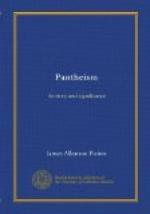2. In the times from which the first known Pantheistic teaching dates, ideas of nature’s order were incongruous and indeed incommensurable with ours. Not that the world was then regarded as a chaos. But such order as existed was considered to be a kind of “balance of power” between various unseen beings, some good, some evil, some indifferent. True, some Indian prophets projected an idea of One Eternal Being including all such veiled Principalities and Powers. But their Pantheism was necessarily conditioned by their ignorance of natural phenomena. In fact, an irreducible inconsistency marred their view of the world. For while their Pantheism should have taught them to think of a universal life or energy as working within all things, their theological habit of mind bound them to the incongruous notion of devils or deities moulding, or at least ruling, matter from without. And, indeed, the nearest approach they made to the more genuine Pantheism of modern times was the conception of a world emanating from and projected outside Brahma, to be re-merged in him after the lapse of ages. Now, if I am right in my definition of Pantheism as absolutely identifying God with the Universe,[3] so that, in fact, there cannot be anything but God, the inconsistency here noted must be regarded as fatal to the genuineness of the Indian or indeed of any other ancient Pantheism. For the defect proved during many centuries to be incurable, and was not indeed fully removed until Spinoza’s time.
[Sidenote: 3. Absence of Definite Creeds.]
3. Another difference between ancient Pantheists and ourselves was the absence in their case of any religious creed, sanctioned by supernatural authority and embodied in a definite form, like that of the three Anglican creeds, or the Westminster Confession of Faith. Not that those ancients supposed themselves to be without a revelation. For the Vedas, at least, were considered to be of divine authority, and their words, metres, and grammar were regarded with a superstitious awe, such as reminds us of what has been called the “bibliolatry” of the Jewish Rabbis. But subject to this verbal veneration, the Rishis, or learned divines, used the utmost freedom in regard to the forced and fanciful interpretations extorted from the sacred text, a freedom which again reminds us of the paradoxical caprice shown by some schools of Jewish Rabbis in their treatment of the volume they professed to regard with awe. The various finite gods, such as Vishnu, Indra, Krishna, Marut, or Varuna, were not the subjects of any church creed chanted every day, and carefully stereotyped in the tender minds of children. On the contrary, various roles were assigned by successive generations to these divinities. So that, for instance, Varuna was at one time the god of the ocean, and at another of the sky. But the uniform tendency of all poets and Rishis alike was to seek, beyond all these gods, one unbeginning, unending, and all comprehensive Being, from whom these “devas” emerged, and into whom they must return. Not only so, but it is clearly suggested in many passages, of which an instance will presently be quoted, that the Eternal, called Brahma who was the true Self of all gods, was also the true Self of man and bird and beast. So that, in fact, notwithstanding the illogical emanation theory, He was the only real Being, the All in All.




